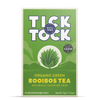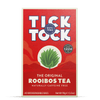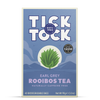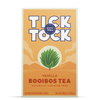At Tick Tock, we always say rooibos tea is brimming with benefits.
And we should know! We've been fanatical about rooibos for four generations (fun fact: it was our very own Bruce Ginsberg that introduced the UK to this special tea).
Named as one of Time's 50 Healthiest Foods of All Time, rooibos tea benefits are celebrated across science and media.

Before we begin, what exactly is rooibos tea?
Pronounced ‘roy-boss’, rooibos (aka redbush) is a naturally caffeine-free tea made from the leaves of the Aspalathus linearis shrub. While it grows only in the Cederberg mountains of South Africa, people all over the world love rooibos tea’s smooth taste and deep red colour. As it pairs perfectly with milk, rooibos is often enjoyed as a delicious and gentle alternative to black tea.
Top 9 benefits of rooibos tea, at a glance
1. Supports good sleep2. Safe for the whole family
3. Better for iron absorption
4. Super soothing
5. Boost your natural defences
6. Helps keep bones healthy
7. Supports skin health
8. Blood sugar control
9. Weight management
1. Supports good sleep
One of the best-known benefits of rooibos tea is that it’s naturally caffeine-free. While black and green teas come from caffeine-containing Camellia sinensis, the rooibos shrub has no caffeine in its genetic make-up. Why does that matter? Because caffeine can affect our sleep, both in quantity and quality, contributing to insomnia and poor sleep patterns. So, are there benefits of rooibos tea for insomnia? Indirectly, yes! For the best chance of a good night’s rest, a caffeine-free option like rooibos is a great choice, especially if you love a warm cuppa as part of your wind-down bedtime ritual.
Bonus benefit #1: jitters free!
You might be familiar with that feeling you get when you’ve had one cup of tea or coffee too many. Ranging from feelings of irritability to anxiety, ‘the jitters’ is associated with consuming large quantities of caffeine.
Of course, caffeine is not necessarily bad for you. It’s a natural stimulant which can even have some benefits when taken in moderation, especially when it comes to short-term alertness. However, when consumed in excess it can also lead to a number of adverse side effects. These include palpitations, increased blood pressure and anxiety.
If you’re prone to such symptoms, avoiding caffeine is an easy way to dodge the jitters.
2. Safe for the whole family
Children and pregnant women are commonly advised to limit their caffeine intake or avoid drinking caffeinated drinks altogether. Rooibos is a delicious and natural option for the whole family - especially as a bedtime drink.
3. Better for iron absorption
Some plants, such as the tea bush Camellia sinensis, produce natural chemicals called tannins to deter pests. These can end up in our food and drink, indeed, black and green teas contain high tannin levels. The problem is that consuming tannins in our diets can interfere with iron absorption. Iron is an important part of a healthy diet and is key to making red blood cells which carry oxygen around the body.
As well as being naturally caffeine free, rooibos tea has very low levels of tannins. So if you love tea but are worried about your iron levels, rooibos is a smart way to get your cuppa fix!
Bonus benefit #2: no bitterness!
Why do we add milk and sugar to black tea? You might not give it much thought as you reach for the milk carton and sugar packet, but this habit came about because of the desire to counter the natural bitterness and astringency of the tea. Bitterness that is caused by – you guessed it – tannins! In comparison, rooibos tea is wonderfully smooth, naturally sweet, and often enjoyed black (or red, as we like to say!) as well as white.
4. Super soothing
In South Africa, rooibos tea has long been known for its soothing properties. It’s a celebrated home remedy, given to infants with colic and people with digestive issues for generations.
More recently, scientific research continues to shed light on the soothing power of rooibos. Compounds in rooibos tea, such as quercetin, orientin and vitexin are antispasmodic: they help relax the digestive system and ease discomfort. The soothing benefits of rooibos tea might also be thanks to its anti-inflammatory properties, a product of its high levels of antioxidants.
This soothing aspect has also made it useful for anxiety, asthma and allergies.

5. Boosts your natural defences
Another of the benefits of rooibos tea being rich in antioxidants is related to the role these play in our natural defences and long-term health. Rooibos contains many antioxidants, most notably aspalathin, a flavonoid antioxidant particular to rooibos. Studies suggest that consuming antioxidant-rich substances regularly can help prevent the destructive effects of free radicals, which have been linked to conditions such as heart disease, stroke and cancer.Antioxidants could therefore help boost the body’s internal defences against disease, and rooibos is a delicious way to get a regular antioxidant hit!
6. Helps keep bones healthy
Rooibos tea contains minerals that are important for general bone health, such as calcium, manganese and fluoride. It also boasts two less common compounds - the flavonoids luteolin and orientin, which could enhance the mineral content in bones.
Together with eating a balanced diet, exercising and getting plenty of vitamin D, drinking rooibos is a delicious way to support your bone health.
7. Supports skin health
What are the benefits of rooibos tea for skin? There’s reason to believe there are a few! Firstly, the anti-inflammatory properties discussed above could reduce irritation and redness in the skin. This is why rooibos is a time-honoured home remedy for sunburn in South Africa.Rooibos tea contains a number of compounds that are associated with skin benefits. It’s a source of alpha hydroxy acid (AHA), commonly found in skincare products. It also contains zinc, which is used in the treatment of acne and eczema. Finally, it boasts superoxide dismutase, an enzyme that encourages the production of healthy skin cells. This works with other antioxidants to counter the effects of free radicals, which are associated with the signs of aging.
It's a developing area of research, but early studies suggest that applying rooibos to the skin topically could even reduce the appearance of wrinkles!
8. Blood sugar control
Research suggests that rooibos tea could be beneficial for diabetes sufferers and those looking to manage their blood sugar levels. Animals studies show that aspalathin – a polyphenol in rooibos tea - helps regulate blood sugar and increase glucose tolerance. The Tea Advisory Panel found that fasting blood glucose was more stable in those that had regularly consumed rooibos.
Bonus benefit #3: naturally sweet!
You can enjoy the benefits of rooibos tea without sugar – with its lightly honeyed notes, rooibos has a natural sweetness that requires no added sugar or sweeteners.
9. Weight management
Rooibos tea has been linked to weight loss, as featured in Channel 4's Food Unwrapped series. In the programme, they looked at ongoing research and discussed 'the secret ingredient in redbush tea that could help us burn fat'. The ingredient? Aspalathin – the antioxidant contained only in rooibos! This compound increases leptin levels, which regulates appetite by signalling to the brain that enough food has been consumed. Over time, this could lead to weight loss: subjects in a study given aspalathin regularly had a significant reduction in their stored fat.
Taken ‘red’, rooibos tea has zero calories and is wonderfully hydrating and gentle, making it ideal as part of a healthier lifestyle.
So, what’s the best way to drink rooibos tea?
Experts say that six cups of rooibos tea a day is the recommended amount, but we think even one cup will do good! The best way to drink rooibos tea is to simply add boiling water and leave to brew until it is at the strength you are looking for. The longer you leave it the darker the colour and deeper the flavours. It can be enjoyed with or without milk; you can add honey, a slice of lemon or ginger, and it also makes a fabulous iced tea with some fresh mint and lemon.

Why not see the benefits for yourself?
Feeling like it’s time you gave rooibos a try?
You can find Tick Tock Original Rooibos in our online shop, where you can also explore our whole range of rooibos teas, flavoured rooibos teas and rooibos blends.
Your rooibos tea questions, answered
Can I drink rooibos tea every day?
Yes! You can drink rooibos tea every day.
Can I drink rooibos tea during pregnancy?
Yes! Rooibos tea is high in antioxidants and naturally caffeine-free, making it a popular drink during pregnancy.
Does rooibos tea make you sleepy?
Some people find that the combined lack of caffeine and soothing properties of rooibos does make them feel sleepy. That’s why rooibos is an ideal bedtime drink!
When’s the best time to drink rooibos tea?
You can drink rooibos morning, noon and night – the best time is whenever you enjoy your cuppa most!
What does rooibos tea taste like?
Rooibos tea is exceptionally smooth, with a light malted nuttiness and honeyed sweet tones. When brewed for longer, it becomes full-bodied, rich and woody – but never bitter.
Can you add milk to rooibos tea?
Rooibos is delicious with or without milk, which is one of the reasons many people enjoy it as a caffeine-free alternative to a standard cuppa.
Are there any side effects to rooibos tea?
Sometimes those who are new to rooibos ask if there are any side effects. In answering, the Rooibos Council states “After centuries of use, no negative side effects of Rooibos have ever been recorded.”
Both young and old have enjoyed this special tea for generations and at Tick Tock we look forward to sharing our delicious and award-winning rooibos with tea lovers for years to come.




